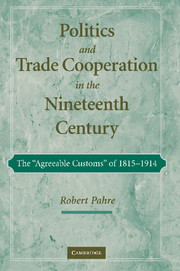Book contents
- Frontmatter
- Contents
- List of Figures
- List of Tables
- Preface
- POLITICS AND TRADE COOPERATION IN THE NINETEENTH CENTURY
- PART ONE COOPERATION AND VARIATION
- PART TWO DOMESTIC POLITICS AND TRADE POLICY
- 2 Conceptualizing and Measuring Trade Policy
- 3 A Political-Support Theory of Trade Policy
- 4 State Capacity, Fiscal Concerns, and the Tariff
- 5 Political Institutions and Tariffs
- PART THREE POLITICAL SUPPORT AND TRADE COOPERATION
- PART FOUR NORMS AND COOPERATION
- PART FIVE CONCLUSIONS
- References
- Index
4 - State Capacity, Fiscal Concerns, and the Tariff
Published online by Cambridge University Press: 08 December 2009
- Frontmatter
- Contents
- List of Figures
- List of Tables
- Preface
- POLITICS AND TRADE COOPERATION IN THE NINETEENTH CENTURY
- PART ONE COOPERATION AND VARIATION
- PART TWO DOMESTIC POLITICS AND TRADE POLICY
- 2 Conceptualizing and Measuring Trade Policy
- 3 A Political-Support Theory of Trade Policy
- 4 State Capacity, Fiscal Concerns, and the Tariff
- 5 Political Institutions and Tariffs
- PART THREE POLITICAL SUPPORT AND TRADE COOPERATION
- PART FOUR NORMS AND COOPERATION
- PART FIVE CONCLUSIONS
- References
- Index
Summary
“Although the ‘free traders’ might have been expected to press for the reduction of tariffs, their enthusiasm was tempered by the knowledge that government revenue had to be raised somehow, and one obvious alternative to the tariff – a tax on land – was abhorrent to the powerful latifundistas.”
– Victor Bulmer-Thomas (1994: 140)The political-support theory in Chapter 3 emphasized how trade policy responds to exogenous change, partially compensating those groups that are harmed. Though it examined some cross-national variation in trade policy, the focus was on intertemporal patterns, especially on economic variables such as the terms of trade.
This chapter and the next examine cross-national differences in political institutions that help explain further variations in the autonomous tariffs of each country. This chapter focuses on the administrative problems of revenue collection, whereas Chapter 5 examines the effects of democracy. The aftermath of the Napoleonic Wars, which produced both fiscal crises and partial democratization as taxpayers demanded greater representation, provides background conditions for the changes that I discuss.
The question of tax collection is important because scholars frequently argue that a state's need for tariff revenue precludes trade liberalization that the government would otherwise pursue. For example, Percy Ashley (1926: 27) argues that Austria could not negotiate tariff reductions with the German Zollverein until its finances were in better order, especially after the expensive lost war of 1859 (see also Matis 1973).
- Type
- Chapter
- Information
- Politics and Trade Cooperation in the Nineteenth CenturyThe 'Agreeable Customs' of 1815–1914, pp. 105 - 131Publisher: Cambridge University PressPrint publication year: 2007



